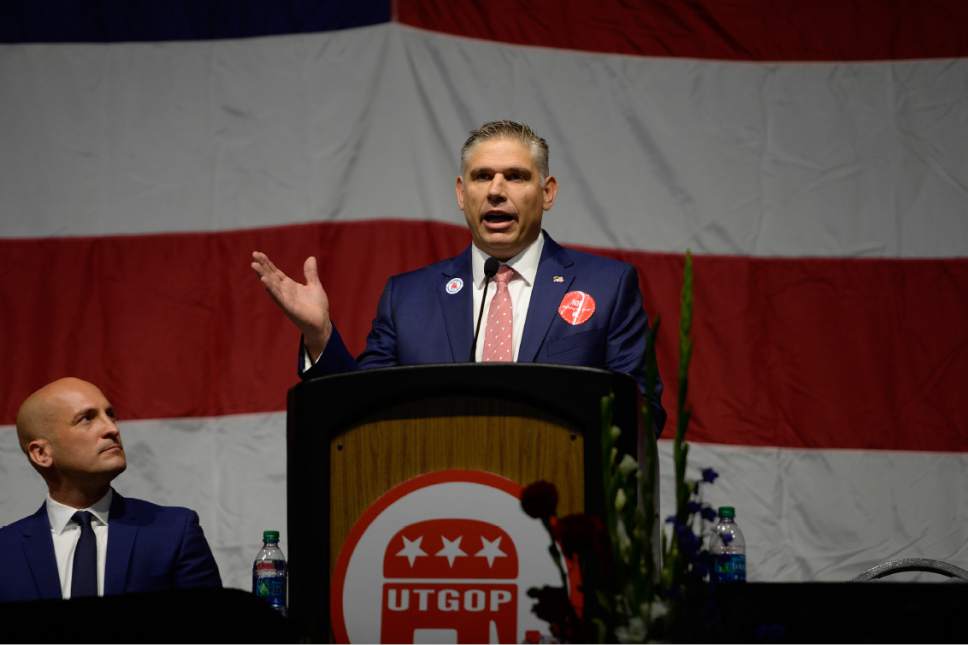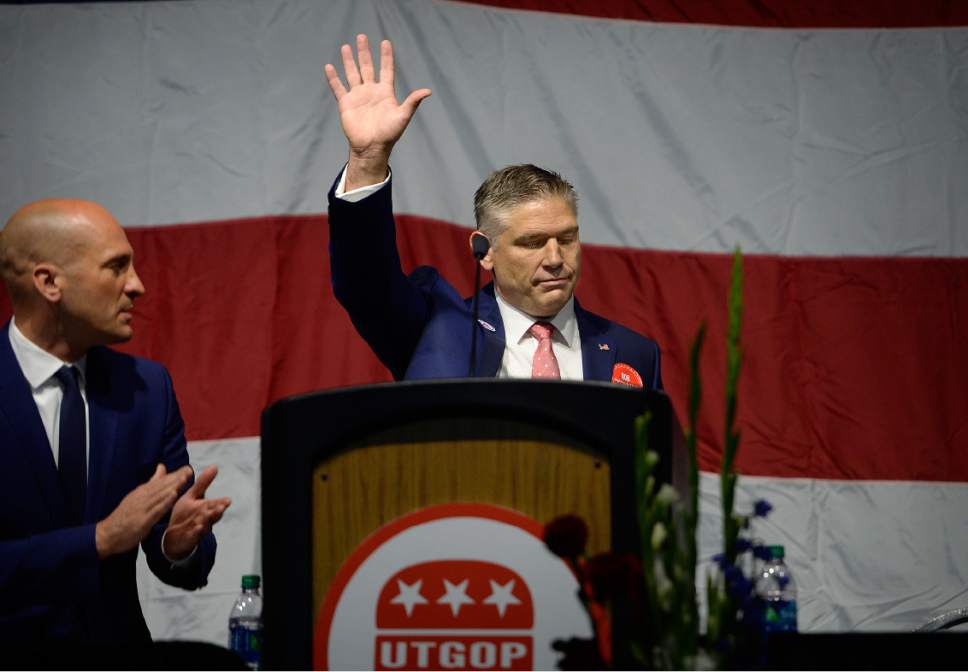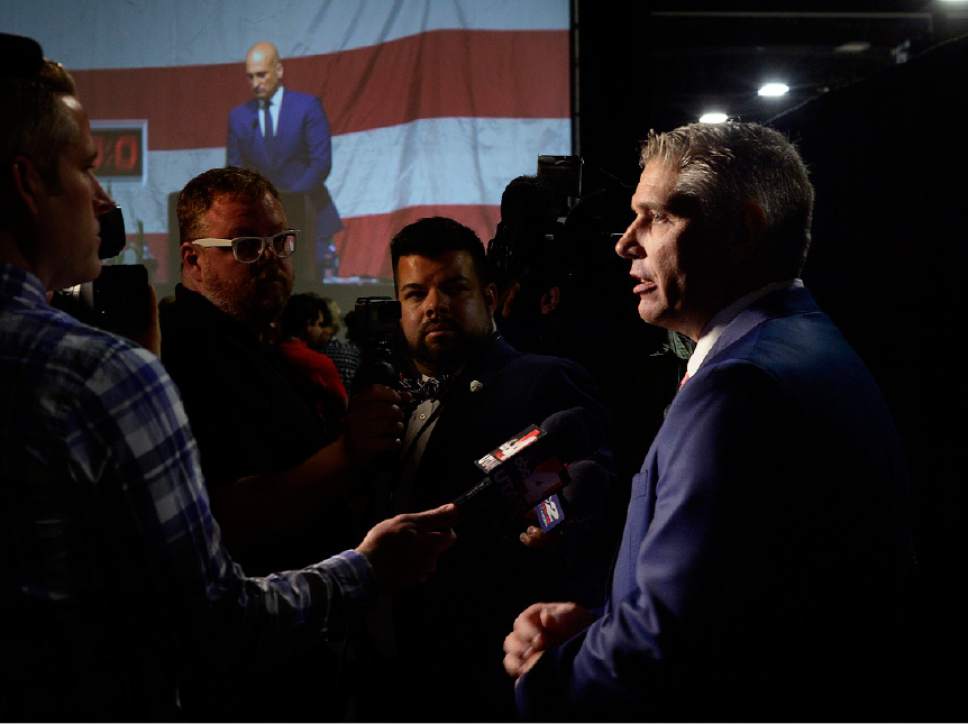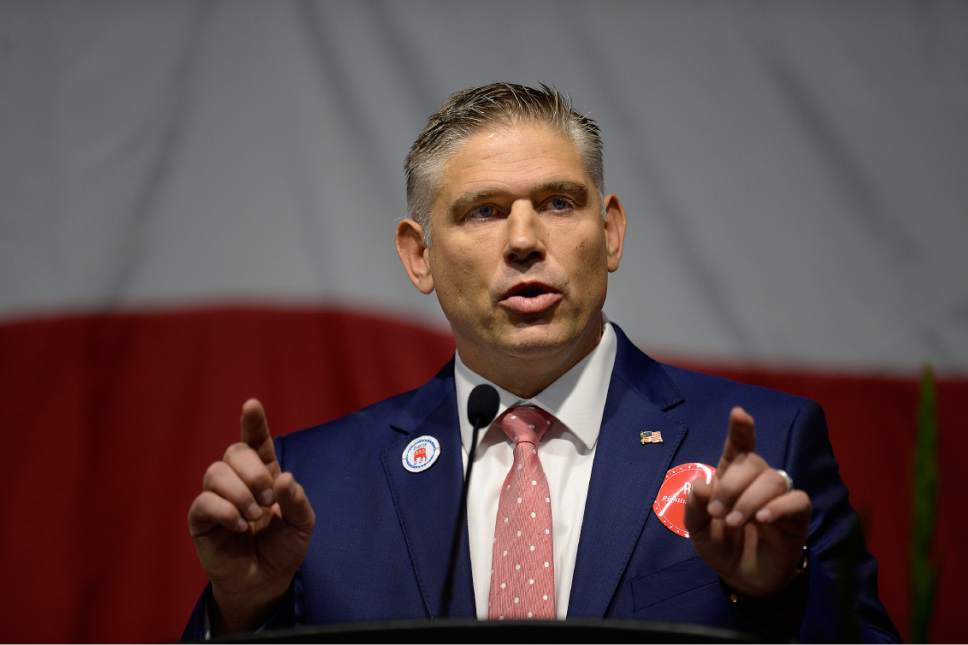This is an archived article that was published on sltrib.com in 2017, and information in the article may be outdated. It is provided only for personal research purposes and may not be reprinted.
New Utah GOP Chairman Rob Anderson says he seeks to heal the rift between Republicans who favor the traditional caucus-convention system to select nominees and those who also want to allow a path to the primary for those who collect signatures.
He's just not sure which solution might end the party's civil war — and he's talking to all sides.
But Anderson says he's fairly confident that one idea will not work: simply repealing SB54, the law that allows both signature gathering and the caucus-convention system.
"Asking the Legislature to repeal SB54 is probably the wrong option if you value the caucus-convention system," Anderson said in an interview Tuesday.
That's because without other protective compromises, he said, a repeal simply may lead to the restart of the old Count My Vote initiative asking voters to discard the caucus-convention system for an open primary.
"And given the polls, they would probably win," he said.
For example, a Dan Jones & Associates poll earlier this month for UtahPolicy.com found that 76 percent of Utah voters prefer that all voters select nominees, and only 19 percent favored leaving that decision to party delegates.
"I'd like to bring everyone together," Anderson said, both right-wing caucus-convention supporters and more moderate SB54 supporters. "They are all under the umbrella of the Republican Party."
The airline pilot adds, "My job is to represent everyone in that spectrum. It's not just to represent a particular faction."
Anderson said it is too early for him to discuss many options, because that may lead the different sides to figure he favors one or the other, but he gave an example of one possibility being discussed.
It would make it more difficult for party delegates to select nominees by themselves. Currently, a candidate wins the official party nomination if he or she achieve 60 percent of the convention vote.
Anderson said raising that threshold to 70 percent or more would make it more likely that party would simply narrow the field to the top two candidates — and allow voters to choose between them. It might mollify those who complain voters should have more choices, and even lead all to agree to drop signature gathering.
He said other options may look at how to make delegates more representative of all Republicans. They tend to be much more conservative now, shown by Gov. Gary Herbert finishing second in convention last year to conservative Jonathan Johnson — but Herbert easily won the primary, and won the general election in a landslide.
Anderson said he hopes to talk soon to Count My Vote leaders, and Rich McKeown, executive co-chairman of that group, says he also requested such a meeting.
McKeown adds that Count My Vote supporters have been encouraged by the election of Anderson earlier this month over incumbent Chairman James Evans and party Vice Chairman Phill Wright — who actively fought SB54, and supported expensive party lawsuits against it.
McKeown said his group feels SB54 is "a pretty elegant solution, and we entered into a deal [to halt its ballot initiative for an open primary] that we expected to have some degree of permanence. The ongoing assault by the Republican Party has been disquieting."
He praises Anderson for "trying to re-engage the business community" and others that supported SB54. McKeown, for now, also would not vow to re-launch the Count My Vote petition if SB54 is revoked, saying that is a fairly distant possibility — and it is more important to focus on possibilities to bring the party together.
"My position has been: Let's see if we can't continue to work this out. If we can't work it out, then we would have to figure out what the next step should be," McKeown said.
Anderson signed the original Count My Vote petition. He said it was largely in protest of methods some GOP leaders were using to fight it.
He was at a Davis County GOP executive committee meeting where he said leaders at the time wanted to fight the petition by showing up at tables used by signature gatherers to start confrontations, figuring potential signers don't like confrontation and would leave. "We don't need that kind of negative approach. If the caucus-convention system is so good, we don't need to do that."
At this time, Anderson is not withdrawing the party's lawsuit against SB54, which is on appeal to the 10th Circuit Court of Appeals. "It doesn't cost us anything to keep that paperwork on file," he said — adding the party will re-evaluate when it would cost more, such as perhaps planning for oral arguments.
That lawsuit and the ongoing rift has hurt the state party financially. The party owes more than $300,000 in legal fees for the SB54 lawsuit, and many donors quit giving because they wondered if their money would go to that. Overall, it is more than $400,000 in debt.
"It's really bad. I wonder if we can make payroll," and the party is even a month behind on the rent for its headquarters, Anderson said. "I've never, ever been in a financial situation like this," adding it makes it hard for him to sleep at night.
He laid off the party's highest-paid employee, former communications director Cindie Quintana.
New Executive Director B.J. Griffin is working as a volunteer for now.
Anderson said fundraisers are planned to help dig out of the hole. But he said a key may be ending the split over SB54, making all sides more willing to donate to the party with the understanding their money will clearly go to help elect Republicans.









